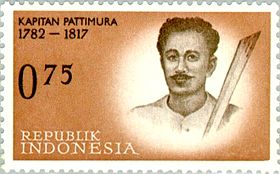Pattimura
| Thomas Matulessy | |
|---|---|
 |
|
| Nickname(s) | Pattimura |
| Born |
8 June 1783 Haria, Saparua, Maluku, Dutch East Indies |
| Died | 16 December 1817 (aged 34) Nieuw Victoria, Ambon, Maluku, Dutch East Indies |
| Allegiance |
|
| Service/branch |
|
| Rank | Sergeant major |
| Battles/wars | Pattimura War |
| Awards | National Hero of Indonesia |
Thomas Matulessy (8 June 1783 – 16 December 1817), also known as Kapitan Pattimura or simply Pattimura, was an Ambonese soldier and National Hero of Indonesia.
Born on the island of Saparua, Pattimura joined the British army after they took the Maluku islands from the Dutch colonials. When the islands were returned to the Dutch in 1816, he was dismissed. Concerned that the Dutch would implement programs that limited his people, Pattimura led an armed rebellion that captured Fort Duurstede on 16 May 1817. Killing the inhabitants of the fortress and fighting off Dutch reinforcements, on 29 May he was declared the leader of the Maluku people. After being betrayed by the King of Booi Pati Akoon, he was captured by Dutch forces on 11 November and hanged the next month.
Pattimura has become a symbol of both Maluku and Indonesian independence, praised by President Sukarno and declared a national hero by President Suharto. He has several namesakes both in the capital of Maluku, Ambon, and in the rest of the Indonesian archipelago.
Pattimura was born Thomas Mattulessi on 8 June 1783 in Saparua, Maluku; the name Pattimura was his pseudonym. His parents were Frans Matulessia and Fransina Tilahoi, and he had a little brother named Yohanis. In 1810, the Maluku islands were taken over from the Dutch colonials by the British. Mattulessi received military training from their army and reached the rank of sergeant major.
After the signing of the Anglo-Dutch Treaty on 13 August 1814, in 1816 the Maluku islands were returned to the Dutch; Pattimura attended the ceremony. Afterwards, in violation of the treaty, he and his fellow soldiers were discharged to their hometowns. However, Pattimura refused to accept the restoration of Dutch power. He felt that they would stop paying native Christian teachers, as they had done in 1810, and was concerned that a proposed switch to paper currency would leave the Maluku people unable to give alms — only coins were considered valid — and thus lead to churches being unable to help the poor.
...
Wikipedia
